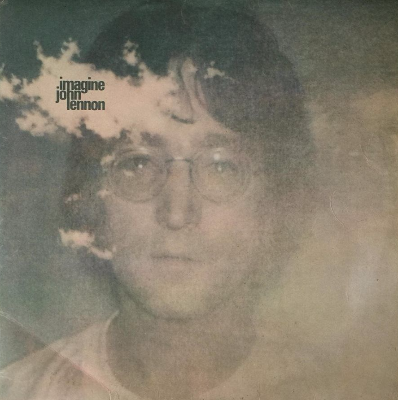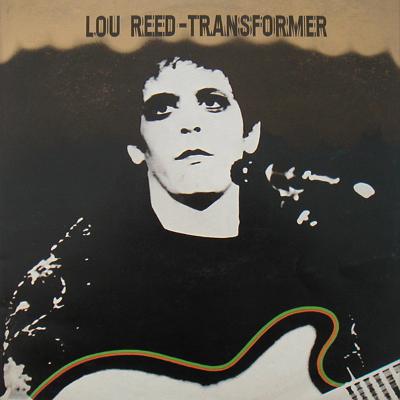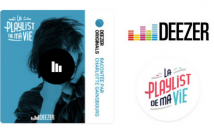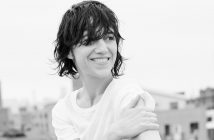Ahead of her appearance on The Quietus’ stage at this year’s Field Day Festival, Charlotte Gainsbourg takes Jeremy Allen through her favourite albums, from Portishead to Bach, Lou Reed to her dad
By Jeremy Allen, The Quietus, April 25th, 2018 07:45
Charlotte Gainsbourg’s albums are a lot like tattoos, souvenirs that evoke strong memories of important moments in her life. She’s recorded four so far in just over 30 years, and the latest is her most resplendent. Rest is also the one where she’s ultimately exerted the greatest control as designer as well as artist.
“The first one was done with my father, by my father,” she says of her 1986 debut Charlotte For Ever, recorded with her legendary paterfamilias Serge. “I wasn’t in control of anything, but that was the way he did music, and I’m so happy that I got a chance to do it.” The next album was recorded 20 years later with Air, at a time when she “was an adult” but “wasn’t acting like one.” Jarvis Cocker penned the lyrics. “I tried to be as personal as I could, giving him an idea of who I was, but it was his vision of me”.
Things gelled artistically with Beck on a 2009 album inspired by her experiences with an MRI machine (in France it’s called IRM, the name of the album). Not only was it hitherto her best record, it was also Beck’s best record for a long while too. “I went to Los Angeles each time and it was very much his environment and his influences with my input,” she says, talking over the phone from London. “I had many IRM scans because of an accident, and I wanted to talk about that. That spoke to him, but again it was his vision of a troubled mind he encountered at the time.”
Charlotte Gainsbourg’s story is woven into the fabric of French popular culture; indeed she was present on the cover of Histoire de Melody Nelson, albeit as a bump in her mother Jane Birkin’s tummy covered discreetly by a toy monkey. But on Rest she’s stepped further out of the long, eclipsing shadow of her folks.
Serge Gainsbourg – L’Homme a tête de chou

I could have chosen Histoire de Melody Nelson but I’ve selected L’Homme a tête de chou (Man with a cabbage head) just for a change. The story of Marilou is on that record, and it’s also the voice of my father which I treasure. It’s always hard to have your parents as singers – they have a singer’s voice and they have their personal, private voice. He hated his voice in the earlier days where he sang much more. This is a real portrait of him; Melody Nelson is a portrait of both of them, and it’s a fantasy, and it’s different. This one for me is really as original and as melodic and modern as Melody Nelson.
You know, ‘Aeroplanes’ is a beautiful song. He was just brilliant at taking whatever time he needed. Now songs are so formatted, but here there are songs that are seven minutes long. It’s a real voyage and a real story. ‘Marilou Sous La Neige’ is one of my favourite songs because it’s so melodic, and he has the most beautiful voice on it.
I think it came out in 1976. We were living with a nanny. The cover shot was taken in a garden that wasn’t his. He put L’homme a tête de chou – which was a statue he bought for himself – in the garden and photographed himself with the statue. Now the statue is in his house. I have his house, I bought his house and it’s all I have left of him – all his old objects, his whole environment. I guess it’s very much linked with this album.
Radiohead – OK Computer

It’s one of my favourites of Radiohead. I think I like all of them. It’s so rare to have a band where you just rush to the store to buy their new album, but that’s been the case from the beginning with them for me. I think OK Computer is the one that resonates the most with me – the one I often listen to; In Rainbows is another one I adore, Kid A also.
Seeing Thom Yorke and Radiohead live each time was a revelation about how music can be lived – not in an animal way – but more about inhabiting the music. It was a new way of performing and dealing with his own persona that I found so interesting. I don’t like seeing live shows, I’m always uncomfortable, I don’t know how to be. But when I see Radiohead each time it’s always a rare moment. So it made sense to chose that album.
Dick Hyman – Dick Hyman Plays Fats Waller

I’m not a huge fan of jazz, but I’m a huge fan of piano playing. This just corresponds to a time where our son had just been born, and we had this music system with a valve amp that was just incredible. It’s a beautiful object and at the same time the sound is just amazing.
So this Dick Hyman album was a revelation at the time, because we listened to it over and over again. It has such an atmosphere. It’s just piano. It’s a wonderful piece of music which puts you in a certain mood. Which is always good.
John Mayall – The Turning Point

I’m no fan of live albums or even live shows, but this album somehow makes it different. I didn’t see the live show because I wasn’t born; it was recorded in New York in 69. But it’s an album for me that you listen to from the beginning to the end, and it does make a difference. All these albums that I’ve talked about, the same happens with each of them: you go from song one to, I dunno, song 10 or song 12. And you don’t just pick a song.
For me The Turning Point is always on at home. Yvan [Gainsbourg’s partner] made me discover this album and he sort of educated me in a different way. I met him when I was 19, so I wasn’t fully educated music wise. So he introduced me to Mazzy Star, to John Mayall, to Radiohead also. I don’t know why I respond so vividly to this album. I don’t know how to describe what it means to me really, it’s just one of those albums that accompany you through years and years. It was a different sound and a real discovery.
John Lennon – Imagine

Again, you have albums that refer to a certain point in your life – a real moment. This album I had to put in because when I met Yvan we lived together straight away, and we made a very long journey in my car at the time and I only two cassettes. I had a comedian called Coluche and I had Imagine. There was also a lot of classical music that he didn’t respond to, and so he picked Imagine.
So we really listened to it nonstop for hours and hours for what was our first road trip. And it became our album and ‘(Just Like) Starting Over’ became our song. I feel embarrassed because it’s so cheesy to have a song that symbolises the beginning of a love story, but I have to admit that that was the one.
Ian Dury – New Boots and Panties!!

That was my first album, I was six. Kate, my sister, imposed her music on me because we lived in the same room. She always got to pick the albums. She was very disco-oriented, Blondie was always on and I loved it, but that was her choice to go really full on disco. I don’t know how I picked this album – I remember the cover of him with his son so vividly but it was my choice. It was like a statement I made. I think it was also the provocation I loved; the fact that he was swearing amused me at my age. The sound of it makes me smile. It’s an album that I’ve treasured since I was six years old.
Was writing about Kate a cathartic process?
No, I don’t think it helped, and I don’t think I did it to help me. It’s just that I had started the record, and she died during the process. We were still trying to figure out how to work together, Sebastian and myself. Six months after Kate died I knew that I had to move away from Paris, to take my family and try to make a new life happen. And so we chose New York. It was only then that the record took a different slant, and of course at the time I was obsessed by her. And even with the business of New York I only wanted to talk about her, I only wanted to sing about her and to write about her, so she became the centre point of the whole work. It wasn’t intended that way of course, and it wasn’t intended as a psychological move to sooth… not really.
Lou Reed – Transformer

I think it’s just one of the best albums. I heard that he wasn’t a nice person in real life. It doesn’t make sense! That thing that horrific people can be brilliant artists is something that you don’t want to hear. So anyway, this album I discovered quite late. I was already 36 and I was recording with Nigel Godrich on the Air album [Talkie Walkie] and I knew the songs from Transformer but I didn’t know they were all from the same album. It was one of those things where you have a revelation just of the genius of one record. Also being a short album, every song is a treasure – a diamond! It’s so, I dunno, it’s the one of the most beautiful albums.
I’m not very good talking musically. With Sebastian at the start I had to have images to discuss what I wanted. It was a way to give the right adjectives to describe the mood I wanted. I wish I could be more technical. I’d love to be more technical. It’s like with films – I still don’t know how to read a script, I just respond in a very spontaneous way. With music it’s the same thing – I don’t know why a song strikes me. I don’t know why I respond or don’t respond well to something. It’s just instinct. I wish I could be more specific about Transformer because I’m sure there’s more to say.
Portishead – Dummy

In 1994, when I first heard this band, I think the whole world had a revelation; this ovni. In French, an ovni is a kind of phenomenon of some sort. In France, you say it’s an ovni, meaning it’s so new and surprising. For me it was the revelation of a sound that was going into that electronic vibe, discovering music with a new voice and a new way… again it’s very much linked to Radiohead. I don’t know if they would like that comparison but for me the comparison does exist.
Of course there’s this darkness, but also this electronic sound that I discovered for the first time with them. And also it’s funny how there’s a link with the live performances. It’s as if Thom Yorke never made a compromise in his singing life, which was the same with Beth Gibbons. I liked Massive Attack and Tricky but I reacted to those albums in a different way. Perhaps the fact she was a woman spoke to me more, and the fact she inhabited those songs. Again it’s this idea of no compromise. I don’t know her but it seems very true to who she is. When Dummy came out, the idea of making music again very slowly emerged for me thanks to her, and thanks to this new atmospheric sound. I asked myself questions again, so for me it was kind of a starting point.
Heinrich Schütz – Kleine Geistliche Konzerte

In French it’s called Petits concert spirituel. It’s with castrato voices – two very high boy’s voices. And it’s very religious. I’m not at all religious and I would be more attracted to my father’s religion than the Christian side. And I must say the religious aspect has nothing to do with the fact that I chose it. I dunno how I discovered this album but I’ve always been very responsive to boys’ voices before they break. Maybe there’s something about the transience where you know how precious it is because it won’t last. It’s an album that I have to listen to on my own because everybody in my house hates it, but to me it just lifts me up. There’s something I find completely beautiful and, I dunno, it’s very trippy to me. It’s in German so I have no idea what they’re saying, but I know it’s religious. There’s an energy that’s quite weird.
My father was Jewish and my mother is Church of England, so I’m both. But he hated religion. Even before the war his family were never religious. I had a spiritual attraction when I was 13 and he didn’t understand what was going on with me at the time. He was sort of embarrassed, but at the same time he didn’t criticise anything, but I could see that it wasn’t really something he understood [laughs]. I fell out of that a few years later. I think it’s quite normal at that age to want to belong.
Bach – Goldberg Variations

I think Bach’s Goldberg Variations was the album that was the most recurring when I was growing up. And I think in my father’s house and my mother’s house they were both listening to that album. I did too. It’s one of those albums that just comes back to you. There’s a peacefulness and there’s an energy at the same time. It’s one of the albums I go back to whatever state I’m in. Sometimes you avoid certain music because you want to avoid the power it has, but this one has a very strange power in the sense that it can accompany any kind of mood, and that’s quite wonderful.
My father used to listen to Chopin and Bach. My mother listened to Mahler a lot. Then I started the piano and my father didn’t want me to do music. He didn’t want me to play the violin my mother gave me as a Christmas present when I was maybe 6, and he chucked it in the bin because he didn’t want to suffer from the noise it made as you learn it [laughs].
But the piano for him was a very traumatic episode in his life. His father taught him classical piano and it was torture for him. He told me of his memories of having to sit down at the piano with his father that always ended up in tears. He hated everything about it but he then, as his father was, became a pianist in bars. He didn’t regret it but he didn’t want to impose it on me. I made that choice when I was nine when they split up. My mother asked me if I wanted to do any music and I leap for the piano.
He wanted to be a painter, and he destroyed everything he made because he wasn’t good enough in his eyes. We have a few of them, not very much, maybe five. You can see he had a frustrated relationship with painting and drawing. Music, the way he did it after, he never thought he was making art. He considered what he was doing was a minor art and not major art like classical music.
George Gershwin – Rhapsody in Blue

I chose this because it was always there. And it also links to Manhattan and Woody Allen films. It’s just for me the best musical piano piece I can think of. It’s modern, uplifting, beautiful and romantic. It’s quite empowering too.
The energy that I find in New York today is exactly that. There’s something I can’t explain, something very uplifting and invigorating. I’m not sure I’ll live there very long, I just needed a break. It’s my fourth year so I’m hoping I can still live there a little bit more and then maybe I’ll come back to Paris. Rhapsody In Blue is a piece I would have loved to have played on the piano but I don’t have that level unfortunately.
The Beatles – The Beatles

Like with Bob Dylan it was only much later on that I discovered the real albums and not the compilations. So the White Album [The Beatles] is the same thing. The Red [1962-1966] and Blue [1967-1970] albums were offered to us when we were children and they were part of our music library and we loved every song. The White Album is more of a real cheese – I don’t know why.
When it comes to the Beatles it’s hard to choose one album. This one is a bit more rock maybe? It still has ‘Blackbird’ and ‘While My Guitar Gently Weeps’ mind you. And ‘I’m So Tired’ is a song that comes to my mind so often just because I am always so tired [laughs]. It’s such a sweet song. Anyway a lot of songs on that album are either a little harsh with a rock sound, or very, very melodic. I just adore it – you never get blasé or fed up of that music which is one of the rarest things. It seems so banal and so stupid to talk about the Beatles because it’s so obvious, but you have to.
I contacted Paul McCartney through my record company but I don’t really know how our meeting got organised, but he agreed to have lunch with me in London, and that was six and a half years ago. I went to this lunch very excited. The lunch happened – it wasn’t like having a meeting, it was very casual and sweet and I suppose there was a shyness about the fact we were sitting together, and I didn’t tell him why we were there for quite a while.
I was very pregnant at the time. We talked about the coming baby and family and very sweet and intimate stuff. It was only at the end that I asked him if he had the time would he spare a song for me. And we parted and I had no idea what would happen or if he’d want to do something. Of course, he was Paul McCartney, and I was already feeling very lucky for having had this opportunity to have lunch with him. But a few weeks later he did respond.
And after that it was embarrassing for me because I wasn’t already working on an album. And I didn’t just want to do this one song, I wanted it to be part of a project. So I waited and I think it was three years later when I was fully into the process of working with Sebastian that I made him listen. But we had to mess with [‘Songbird in a Cage’] in a way that it would resemble us. Resemble me. And with Sebastian he had to make it his own. And that’s what we did – with the singing I tried to do the same.
And then we sent it back to Paul McCartney to see if he still liked it and he did. And he came back to New York and recorded some instruments with us. I saw some footage of the recording session the other day and it seemed like a dream – I can’t remember exactly. I’m sure I was in the same room but at the time I think I was so impressed that a lot of things were going in my mind. You can’t tell [laughs]. It was such a lovely second encounter.




